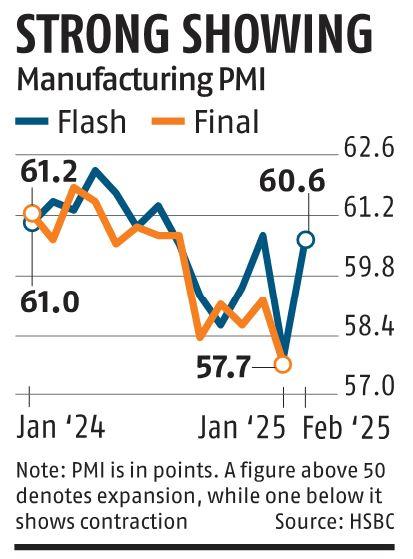NEW DELHI: Private sector output in India increased at the fastest pace in six months during February, amid a quicker expansion in services activity, according to the HSBC flash Purchasing Managers’ Index (PMI) survey released on Friday.
The index compiled by S&P Global rose to 60.6 in February from January’s final reading of 57.7.
The latest survey that provides an early indication of the final data also indicated stronger growth of aggregate sales, which exerted upward pressure on operating capacities and prompted companies to step up hiring.
The index, which measures monthly change in the combined output of India’s manufacturing and service sectors, has been above the 50-level separating growth from contraction for the 43rd consecutive month.
“The rate of growth was also well above its long-run average. Service providers noted a quicker increase than manufacturers, and one that was the strongest in just under a year,” the survey said.
In the manufacturing sector, the flash PMI, which is a composite measure of new orders, output, employment, supplier delivery times, and inventory levels, noted that the majority of the manufacturing PMI sub-components retreated since January.
“Factory orders rose sharply, albeit at a softer pace than in January. The slowdown was often attributed to competitive pressures. On the other hand, service providers welcomed the steepest upturn in new business intakes since August 2024. At the composite level, the rate of growth improved to a six-month high,” the survey noted.
On the export front, the survey noted that the companies operating across India’s private sector economy continued to note improved international demand for their goods and services.
Collectively, new export orders rose at the fastest rate in seven months, with panellists reporting gains from across the globe. Goods producers led on this front, despite a mild loss of growth momentum.
Pranjul Bhandari, chief India economist at HSBC said that rapid restocking around the world continues to lift new export orders and a healthy acceleration in orders and output is keeping firms optimistic about the future.
“Input prices eased while output prices rose at a faster pace, leading to improved margins, especially for goods producers,” she added.
On the employment front, the survey noted that in line with the trend for unfinished business, services companies recruited staff at a stronger pace than goods producers. At the composite level, the overall rate of job creation climbed to a new series peak.
“Qualitative data showed that survey members hired a combination of permanent and temporary workers on full-and-part-time bases. Reportedly due to rising input, labour and transportation costs, survey participants signalled another increase in overall business expenses,” the survey said.
Flash PMI records 75 to 85 per cent of the total 800 responses from services and manufacturing firms each month. The final manufacturing PMI figure for January will be released on March 3, whereas the services and composite PMI figures will be released on March 5.
Source: Business Standard

 Five State-Run Firms Identified For Listing: Govt Explores Ways To Privatise Indebted Discoms
Five State-Run Firms Identified For Listing: Govt Explores Ways To Privatise Indebted Discoms 